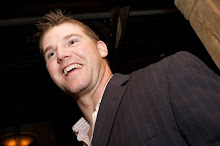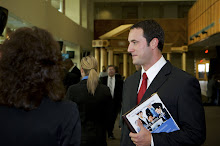Worldwide Panel LLC, a small market-research firm, is getting flooded with résumés for four vacancies in sales and information technology.
However, officials expect to reject numerous applicants after asking them: "What is your greatest weakness?" Candidates often respond "with something that is not a weakness," say Christopher Morrow, senior vice president of the Calabasas, Calif., concern. "It is a deal breaker."
![[Managing Your Career]](http://s.wsj.net/public/resources/images/PJ-AO364_pjMANA_DV_20090202142304.jpg) Robin Eley
Robin EleyThe weakness question represents the most common and most stressful one posed during interviews. Yet in today's weak job market, the wrong answer weakens your chances of winning employment.
Some people offer replies they mistakenly assume that bosses love, such as "I am a perfectionist." That response "will be used against you" because you appear incapable of delegating, warns Joshua Ehrlich, dean of a master's program in executive coaching sponsored by BeamPines Inc., a New York coaching firm and Middlesex University in London.
A careful game plan could help you cope with the shortcoming query in a way that highlights your fit for a desired position. Job seekers who field the question well demonstrate that they can "take initiative and improve themselves," Mr. Morrow says.
The key? Thorough preparation. Career specialists suggest you take stock of your weaknesses, focusing on job-related ones that won't impede your ability to perform your duties. Tony Santora, an executive vice president for Right Management, a major outplacement firm in Philadelphia, says an information-technology manager flubbed a 2007 interview by choosing a personal foible as his reply: "My true weakness is that I am a terrible cook."
Rehearse your responses aloud, role play with a friend or videotape yourself -- but don't memorize your words. As you review the video, look for aspects "you would like to change so you can continue to get better as you practice," says Peggy Klaus, a leadership coach in Berkeley, Calif.
The IT manager changed his tune after practice sessions with fellow job seekers and a counselor in Cincinnati for Right Management. He instead said he worked such long hours that he found it difficult to stay current with world events. So, he spent 30 minutes every evening catching up at home.
When the manager pursued an opportunity at a global drug maker, his revamped response "really resonated with the interviewer," says Mr. Santora. The manufacturer hired the man.
It's equally important that you consider an employer's corporate culture. While being interviewed by a start-up, "you could say, 'My weakness is I get bored by routine,'" says Ben Dattner, a New York industrial psychologist.
Last month, an aspiring executive director of a nonprofit group in suburban San Francisco nearly jeopardized his selection because his reply to a variation of the weakness question ignored one of its core values, according to Ms. Klaus, a board member there. Near the end of his interview, she wondered whether he might have problems with any aspects of the job. "No, I am confident I could do it all," the prospect declared.
Weakness Warnings
A sample of wrong answers to the most common interview questions:
"I have no weaknesses"
"I am a workaholic"
"I can't seem to meet tight deadlines"
"I am impatient with incompetent people"
"I lack judgment when I'm under stress"
"I sometimes make mistakes with my work"
"I'm detail oriented"
"I like to drink now and then"
"I can't tolerate trite interview questions like this one"
Source: WSJ reporting
His flip comment dismayed Ms. Klaus, because she felt he lacked awareness of his weaknesses. She says his response raised doubts among board members that "he would be able to take critical feedback," an attribute the organization values highly.
Because the man was well-qualified, the board gave him a second interview -- and demanded a fuller explanation of his weak spots. He said he had been "unprepared for that question and nervous about coming out with a big fatal flaw," then described his tendency to make decisions too fast during workplace crises. Board members' doubts disappeared, and they picked him for the nonprofit's top job.
Ideally, your reply also should exclude the word "weakness" and cover your corrective steps. Dubbing your greatest fault a "window of opportunity" signals your improvement efforts should benefit the workplace, says Oscar Adler, a retired Maidenform Brands sales executive and author of the book, "Sell Yourself in Any Interview." For instance, he suggests, a salesman might note that he sold more after strengthening his facility with numbers.
When an interviewer pops this nerve-wracking query, your body language counts as well. The wrong nonverbal cues undercut your credibility. Certain candidates hunch over, glance furtively around the room or wring their sweaty palms. "They sort of look like they're being asked a question they can't handle," says Mr. Adler.
Maintaining eye contact, regular breathing and a broad smile impress employers that "you're prepared for the weakness question," says psychotherapist Pat Pearson, author of "Stop Self-Sabotage!"
For the same reason, you seem thoughtful if you pause before responding. But don't wait too long. "If you're going to take a minute," Mr. Morrow cautions, "I've just identified your weakness."
Write to Joann S. Lublin at joann.lublin@wsj.com

![[Managing Your Career]](http://s.wsj.net/public/resources/images/PJ-AO364_pjMANA_DV_20090202142304.jpg) Robin Eley
Robin Eley



